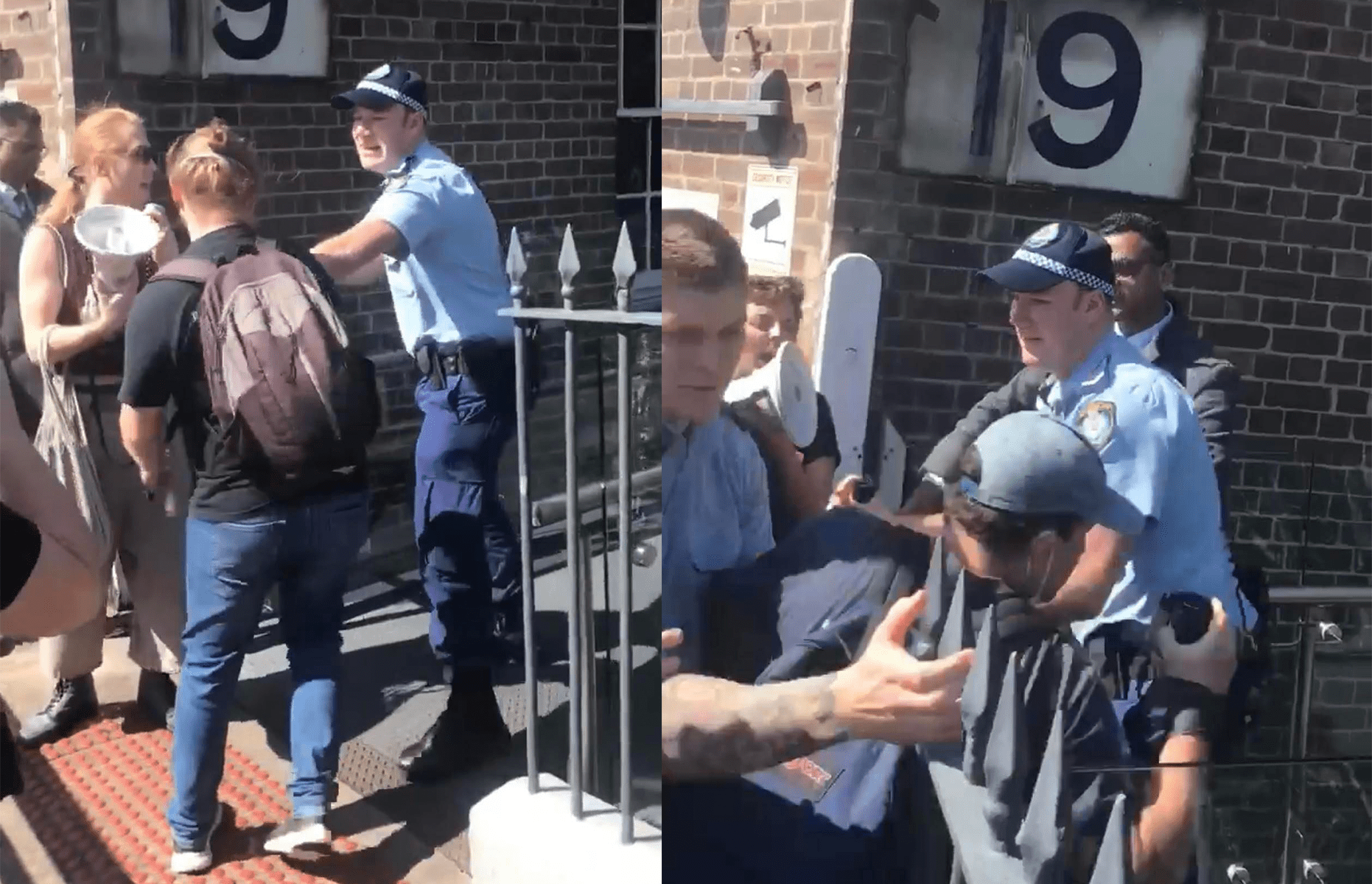Student activists were met with heavy police repression at yesterday’s protest against a higher education summit, with protesters being tackled, pepper-sprayed, and arrested.
Video footage shows police shoving and using tear gas against protesters. Honi understands that one protester was also tackled to the ground and arrested.
“NSW Police were extremely violent with their indiscriminate and unnecessary use of pepper spray,” NUS Education Officer Luc Velez said, “my arms, chest and face are still burning after many hours and I was one of the lucky ones.”
The rally was organised by education activists from the University of Sydney, the University of NSW and the University of Technology Sydney, as well as the National Union of Students in protest against the Australian Financial Review’s (AFR) annual Higher Education Summit.
Police interrupted the rally by moving on protesters outside the Summit’s entrance, forcing protesters to regroup a few hundred metres away as they addressed their injuries.
Rally chair and Macquarie University student activist Amy Lamont was forced to deliver her speech with her eyes shut after being pepper-sprayed, slamming the police’s behaviour as “disgraceful.”
“If anyone who came to this action previously believed the police were here to protect people, they have definitely been made aware of what purpose they actually serve,” Lamont said.
“They are here to protect the rich and the powerful – the property of the one per cent, not ordinary people, our democratic rights or things like education,” she said.
Police were also seen switching off their body cameras and readying pepper spray canisters prior to contact with students.
“What we saw today was a serious attack on the right to protest. You have the right not to be pepper sprayed,” said Greens Senator David Shoebridge.
The AFR describes the summit as an opportunity to bring together university executives, politicians, and business leaders to discuss the future of higher education in Australia.
However, the event is mired in controversy, as previous summits have endorsed systemic course cuts, fee increases, and wage theft. Last year’s counter-summit was online due to the pandemic, but saw students demand an end to austerity measures in the context of university surpluses.
This year’s Summit has been criticised by students for a number of reasons, including the inaccessibility of obtaining tickets, which cost $1000.
Activists also criticised the Summit’s speaking list for privileging university vice-chancellors and chancellors, including those at University of Queensland (UQ), University of Adelaide, UNSW, Charles Sturt University, Australian National University (ANU) and Western Sydney University (WSU), as well as the CEOs of Universities Australia and Group of Eight.
Many of these universities have themselves admitted to systemically underpaying staff.
“Wage theft and exploitation are embedded in the corporate model of higher education. Staff are overworked and underpaid millions of dollars each year, while the University boasts a surplus,” said USyd Education Officer Lia Perkins.
“Higher education needs a radical overhaul from a profit driven model that relies on wage theft, to one where education is free from exploitation and fully funded,” she said.
Other guests included Minister for Education Jason Clare as a keynote speaker, who has come under fire for not reversing the Job-ready Graduates Package that doubled the cost of humanities degrees, as well as attendee Francis Campbell, the Vice-Chancellor of Notre Dame University, who worked as a Private Secretary for former Prime Minister Tony Blair during Britain’s invasion of Iraq.
In response to the Summit’s partnering with the Australian Financial Review and private accounting firm Deloitte, chants of “No Cuts! No Fees! No corporate Universities!” formed the basis of activist demands. This action is part of a larger education campaign arguing for student debt abolition, free education for all and the reversing of job and course cuts.
It also comes in the context of a crackdown on the right to protest in NSW through the Roads and Crimes Legislation Amendment Bill (2022), as well as the establishment of a new police Strike Force Guard.
This follows an established history of repression of student protests. Students last year were chased by police across Victoria Park at an education rally, and assaulted for peacefully occupying the road at Broadway during a climate strike. Similar aggression and violence unfolded at 2020’s higher education cuts protests.





